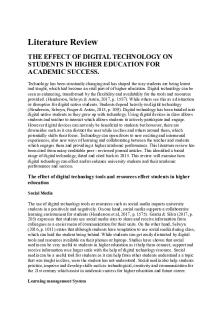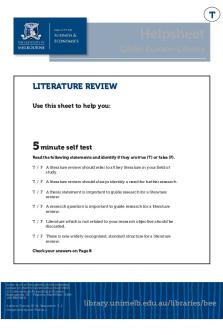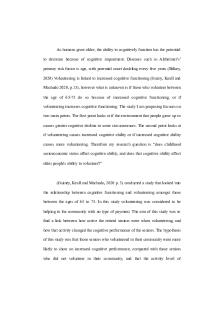Literature Review HOD 2500 PDF

| Title | Literature Review HOD 2500 |
|---|---|
| Course | Systematic Inquiry |
| Institution | Vanderbilt University |
| Pages | 12 |
| File Size | 138.1 KB |
| File Type | |
| Total Downloads | 89 |
| Total Views | 167 |
Summary
final paper...
Description
Running head: ENTITY MINDSET VERSUS INCREMENTAL MINDSET
What is the Effect of an Entity Mindset Versus an Incremental Mindset on Academic Achievement for Students in the United States? HOD 2500: Systematic Inquiry Dr. Van Schaack December 6, 2017
ENTITY MINDSET VERSUS INCREMENTAL MINDSET
2
Abstract The way people think about intelligence can be grouped into two major categories: entity theorists and incremental theorists. Entity theorists view intelligence as being a fixed trait, something that you are born with and cannot improve with effort. Incremental theorists, on the other hand, view intelligence as a malleable property that can be molded and improved through hard work perseverance. One of the main ways that mindset can influence a person’s life is in the way they face challenges. Entity theorists often display a helpless response when confronted with a setback, and will often give up on or avoid tasks that they think they will fail at. In contrast, incremental theorists are more likely to display a mastery-oriented response when they encounter challenges, and tend to increase effort and persevere in the task until they get it right. The purpose of this literature review is to evaluate the effects of an entity mindset versus an incremental mindset on academic achievement for students. There have been a variety of studies conducted that all come to the conclusion that a more incremental mindset has been linked to higher achievement as measured by GPA, standardized test scores, advanced reading levels, and even future career success. This phenomenon is consistent among a variety of populations that vary in age, previous academic achievement, and geographic location.
ENTITY MINDSET VERSUS INCREMENTAL MINDSET
3
What is the Effect of an Entity Mindset Versus an Incremental Mindset on Academic Achievement for Students in the United States? Understanding the way a person views intelligence and growth can be highly indicative of their success in academic and social tasks. Beliefs about intelligence, or “implicit theories of intelligence,” can be categorized into two groups: entity theorists and incremental theorists (Thomas & Sarnecka, 2015, p. 1). Entity theorists tend to operate under a fixed mindset and hold the belief that intelligence and ability are endowed traits and do not grow. Incremental theorists, on the other hand, hold a growth-oriented mindset and tend to believe that intelligence and ability are malleable traits and can be improved with effort (Dweck, 2000; Schmidt, Shumow, & Kackar-Cam, 2017). Individuals who exhibit these mindsets tend to display a variety of predictable traits (Mangels, Butterfield, Lamb, Good, & Dweck, 2006). Entity theorists focus on performance, and are therefore more interested in succeeding at tasks that “prove” their intelligence rather than engaging in potentially challenging tasks. On the contrary, incremental theorists emphasize learning goals and engage in tasks that can be used to refine and improve their skills (Blackwell, Trzesniewski, & Dweck, 2007; Robins, & Pals, 2010). In other words, individuals with an entity mindset shy away from tasks they may fail at, because they do not want to draw attention to their perceived deficiencies in intelligence, while individuals with an incremental mindset embrace challenges because they see them as an opportunity for learning. Helpless and Mastery-Oriented Response Not only does mindset influence the types of tasks people choose to engage in; it also influences how people interact with tasks once they begin. Specifically, an entity mindset makes a person more likely to give up once a challenge is faced, while an incremental mindset indicates a more persistent attitude in the face of failure (Dweck, & Leggett, 1988). These reactions can be
ENTITY MINDSET VERSUS INCREMENTAL MINDSET
4
classified under two well-developed response theories: the helpless response and the masteryoriented response (Diener, & Dweck, 1978). Students who exhibit the helpless response make “maladaptive self-attributions (e.g. “I’m failing because I’m stupid),” while students with a mastery-oriented response make adaptive self-attributions (e.g. “I’m failing because I didn’t try hard enough”) (Robins, & Pals, 2010, p. 314). Subsequently, the helpless response results in students giving up prematurely to avoid confronting their perceived lack of ability, while the mastery-oriented response results in students increasing effort and satisfaction in their final work. The purpose of this literature review is to evaluate the relationship between mindset and academic achievement as measured by grades, standardized tests, and interest in learning. Implicit Theories of Intelligence and Academic Success In 2007, Blackwell, Trzesniewski and Dweck conducted a longitudinal study that followed students through junior high to investigate the relationship between implicit theories of intelligence and academic achievement. Four successive classes of seventh-graders from a public secondary school in New York City participated in this five-year study to create a total sample of 373 students (198 females, 175 males). Although the subjects were from different classes, they have no significant differences in grades or theories of intelligence and were grouped together for the purpose of this study. Academic achievement was measured using the Citywide Achievement Test (CAT), which is a standardized mathematics test every student was required to take in the fall and spring of each year, and student GPA. Each student had the same math teacher and was taught the same curriculum over the four cohorts of classes, which increases reliability in the data because each student was getting the same instruction. At the beginning of the year, students were asked to complete a motivational questionnaire designed to assess “theory of intelligence, goals, beliefs about effort, and helpless
ENTITY MINDSET VERSUS INCREMENTAL MINDSET versus mastery-oriented responses to failure” (Blackwell et al., 2007, p. 249). The questionnaire included statements such as “You have a certain amount of intelligence, and you can’t do much to change it,” or “I like school work best when it makes me think hard” and the students rated their agreement with these statements on a 6-point Likert-type scale anchored by 1-strongly agree and 6-strongly disagree. The mean score for theories of intelligence was M=4.45 with SD=.97 on a scale of 1-6 with low scores representing entity-based theories of intelligence and high scores representing incremental-based theories of intelligence. As predicted, an incremental theory of intelligence was positively correlated (r >.50) with effort-based beliefs rather than ability based, learning goals rather than performance goals, and mastery-based responses. In addition, as the students progressed in junior high, academic achievement as defined by CAT scores and GPA could be predicted from theories of intelligence with a statistically significant (r= .7) correlation coefficient at the .05 level. The more incrementally minded a student was, the better they did. Previous to entering the seventh-grade, intelligence theories were not good predictors of academic achievement, but the data begins to become significant as students progress through junior high. One possible explanation for this is the school had moderately high-achieving students entering the seventh grade, with math scores in the 75th percentile nationally, so it is possible that the students had not yet encountered problems challenging enough to engage their theories of intelligence and trigger their mastery-oriented or helpless responses that would have distinguished the incremental learners from the entity learners. However, as the workload increased and the quality of work became harder in junior high, incremental learners started to succeed at a higher level than entity learners. Another possibility is that student’s mindsets are not solidified before junior high, so they don’t have as much of an effect.
5
ENTITY MINDSET VERSUS INCREMENTAL MINDSET
6
This study provided support for the correlational relationship between incremental theorists and higher academic achievement. There are several explanations presented to describe why this achievement disparity occurs, such as incremental theorists have more learning-based goals, they have positive effort beliefs, low helpless attributions, and use positive problemsolving strategies. However, the present study still lacks to establish causational support for these variables and their effect on academic achievement. Following in the footsteps of Blackwell et al., (2007), Volpe (2016) conducted his own study to replicate and expand upon the evidence provided for an incremental mindset being positively correlated with higher academic achievement. In this study, Volpe sought to investigate the effect of mindset specifically on performance on standardized tests, which has become an increasingly important concern in the wake of the No Child Left Behind Act (Bush, 2001). This research was conducted at a college preparatory charter school in the southwestern United States known for high academic achievement. Although the above-average achievement level provides an interesting aspect for this study, it also limits the generalizability of the results for average and low-achieving students. Before data was collected, the researcher ensured the population size was large enough to have sufficient power to identify effect sizes, which is an important measure to increase reliability of results. The instruments employed in this study were the Northwest Evaluation Association’s Measure of Academic Progress (NWEA MAP) assessment, which evaluates students on Common Core standards and is used across the 50 states, and the “Implicit Theories of Intelligence Scale for Children (ITISC)” (Dweck, 2000), which is the standard test for measuring implicit theories of intelligence. Students were asked to complete the ITISC assessment in advisory period during school hours, and the researcher received those results as well as de-identified information from the school which included
ENTITY MINDSET VERSUS INCREMENTAL MINDSET
7
demographics, GPA, educational program (Special Ed, gifted, etc.), attendance, and NWEA MAP test results. Correlation coefficients were calculated for Math, Reading, and Language test performance and mindset theories score. A moderately significant positive correlation was found for all three dependent variables and incremental mindset scores (.288, .236, and .244 respectively) at a p-level...
Similar Free PDFs

Literature Review HOD 2500
- 12 Pages

Literature Review
- 10 Pages

Literature Review
- 9 Pages

Literature Review
- 6 Pages

Literature Review
- 32 Pages

Literature Review
- 9 Pages

Literature Review
- 5 Pages

Literature Review
- 15 Pages

Literature Review
- 4 Pages

Literature Review
- 16 Pages

Systematic Literature Review
- 9 Pages

Mobile Learning Literature Review
- 26 Pages

Literature review on IFRS
- 11 Pages

Literature Review - guidelines
- 4 Pages
Popular Institutions
- Tinajero National High School - Annex
- Politeknik Caltex Riau
- Yokohama City University
- SGT University
- University of Al-Qadisiyah
- Divine Word College of Vigan
- Techniek College Rotterdam
- Universidade de Santiago
- Universiti Teknologi MARA Cawangan Johor Kampus Pasir Gudang
- Poltekkes Kemenkes Yogyakarta
- Baguio City National High School
- Colegio san marcos
- preparatoria uno
- Centro de Bachillerato Tecnológico Industrial y de Servicios No. 107
- Dalian Maritime University
- Quang Trung Secondary School
- Colegio Tecnológico en Informática
- Corporación Regional de Educación Superior
- Grupo CEDVA
- Dar Al Uloom University
- Centro de Estudios Preuniversitarios de la Universidad Nacional de Ingeniería
- 上智大学
- Aakash International School, Nuna Majara
- San Felipe Neri Catholic School
- Kang Chiao International School - New Taipei City
- Misamis Occidental National High School
- Institución Educativa Escuela Normal Juan Ladrilleros
- Kolehiyo ng Pantukan
- Batanes State College
- Instituto Continental
- Sekolah Menengah Kejuruan Kesehatan Kaltara (Tarakan)
- Colegio de La Inmaculada Concepcion - Cebu

